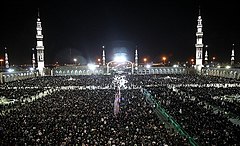
Back Lailat al-'Kadr Afrikaans ليلة القدر Arabic ليلة القدر ARZ লাইলাতুল কদৰ Assamese Лайлатул Къадри AV Qədr gecəsi Azerbaijani قدر گئجه سی AZB Ҡәҙер кисәһе Bashkir শবে কদর Bengali/Bangla Lejletul-kadr BS
| Night of Destiny | |
|---|---|
 Reading the Quran is a key observance of Laylat al-Qadr | |
| Official name | ليلة القدر |
| Also called | Night of Destiny, Precious Night, Night Of Decree or Night of Determination[1] |
| Observed by | Muslims |
| Type | Angels descend to the earth and the annual decree is revealed to them |
| Observances | Tahajjud night prayers, reading the Quran, making dua, doing dhikr, observing iʿtikāf, giving sadaqah |
| Date | Often observed as 21st, 23rd, 25th, 27th or 29th Ramadan and some add 19th to series. |
| Frequency | Annual |
| Part of a series on |
| Islamic culture |
|---|
| Architecture |
| Art |
| Clothing |
| Holidays |
| Literature |
| Music |
| Theatre |
The Night of Power[2] (Arabic: لیلة القدر, romanized: Laylat al-Qadr; also rendered as the Night of Destiny,[3] Night of Decree,[4] Night of Determination, or the Precious Night), is, in Islamic belief, the night when Muslims believe the Quran was first sent down from heaven to the world, and also the night when its first verses were revealed to the Islamic prophet Muhammad; it is described as better than a thousand months of worshipping.[5] According to various hadiths, its exact date is uncertain but was one of the odd-numbered nights of the last ten days of Ramadan, the ninth month of the Islamic calendar. Since that time, Muslims have regarded the last ten nights of Ramadan as being especially blessed. Muslims believe the Night comes again every year, with blessings and mercy of God in abundance.[6] The surah al-Qadr is named after this night, and the purpose of the surah is to describe the greatness of the night. [7]
- ^ Britannica Guide to the Islamic World. Encyclopaedia Britannica, Inc. 2009. ISBN 9781593398491. Archived from the original on 8 April 2022. Retrieved 2 June 2017.
- ^ Daneshgar, Majid; Saleh, Walid A (eds) (2017). Islamic Studies Today: Essays in Honor of Andrew Rippin. Leiden. p. 93. ISBN 9789004337121. Archived from the original on 4 March 2020. Retrieved 31 May 2017.
{{cite book}}:|first2=has generic name (help)CS1 maint: location missing publisher (link) - ^ A. Beverley, James (2011). "Laylat al-Qadr". In Melton, J. Gordon (ed.). Religious Celebrations: An Encyclopedia of Holidays, Festivals, Solemn Observances, and Spiritual Commemorations [2 volumes]: An Encyclopedia of Holidays, Festivals, Solemn Observances, and Spiritual Commemorations. Volume two L-Z. Santa Barbara, CA: ABC-CLIO. p. 517. ISBN 9781598842067. Archived from the original on 4 November 2020. Retrieved 31 May 2017.
- ^ Halim, Fachrizal A. (2014). Legal Authority in Premodern Islam: Yahya B Sharaf Al-Nawawi in the Shafi'i School of Law. Routledge. p. 15. ISBN 9781317749189. Archived from the original on 4 November 2020. Retrieved 31 May 2017.
- ^ Sahih al-Bukhari. "Book of Revelation - Sayings and Teachings of Prophet Muhammad (صلى الله عليه و سلم)". As-Sunnah Foundation of America. Archived from the original on 24 May 2020. Retrieved 21 March 2020.
- ^ Seyyed Hossein Nasr (2015), The Study Quran, HarperCollins, p.1539
- ^ 97:1-5